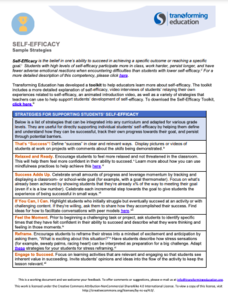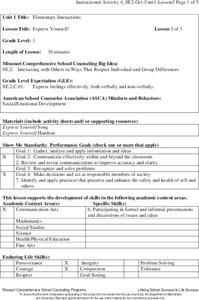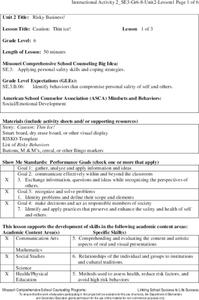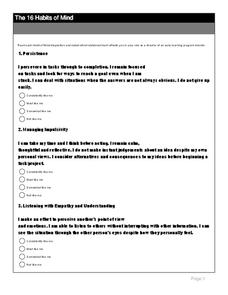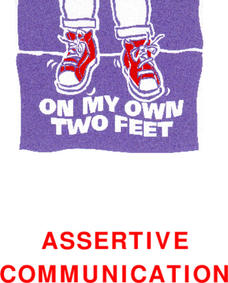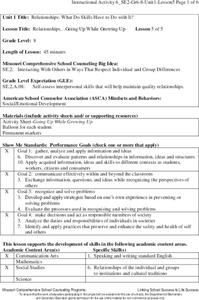Health Smart Virginia
Self-Awareness
Introvert or extrovert? To find out more about themselves, class members fill out an Introvert or Extrovert worksheet. Learners are also introduced to a decision-making model that enhances self-awareness.
Lisa Staab Shadburn
Play Therapy Activities to Enhance Self‐Esteem
Discover activities to help learners increase self-awareness, build peer and family relations, and develop positive self-esteem. Here you'll find six suggestions for instilling a sense of confidence and self awareness in youngsters. Each...
Transforming Education
Self-Efficacy Strategies
Scholars with high levels of self-efficacy perform better in school. Instructors review a list of strategies for enhancing self-efficacy skills. They discover how to teach learners to appropriately define success, celebrate progress, and...
Whole Person Associates
Teen Self Esteem Workbook
Happy teens are healthy teens! Pupils embark on a self-reflective journey using a series of assessments and discussions to promote personal development. The lessons focus on identifying low and high self-esteem attitudes and behaviors,...
Nemours KidsHealth
Self-Esteem
It's important to have healthy self-esteem, but it't not always easy for a teen to identify and maintain it. Support your pupils' healthy self-esteem through grand conversations, daily positive self reflections, and scenario problem...
Missouri Department of Elementary
My Feelings
Encourage self-awareness with a lesson plan that challenges scholars to identify feelings—happy, sad, mad, and scared. Using a feelings thermometer, similar to that of a bar graph, pupils discuss how they would feel in specific scenarios...
Curated OER
Self-esteem and Self-concept
Ninth graders identify and define self-esteem and self-concept, their differences, and how to apply them to their daily lives.
Missouri Department of Elementary
Healthy Touches and Private Touches
Scholars identify the difference between healthy touches and private touches. A discussion leads pupils to recognize several trusting adults. Peers role-play scenarios in which they use three rules to remain safe.
Missouri Department of Elementary
Other Changes (Life-Changing Events Outside of the Family)
Change is inevitable. Kindergarteners discuss coping skills to properly manage changes that can occur outside the family. Scholars reflect on their life changes after starting kindergarten. They discuss their feelings and draw a...
Missouri Department of Elementary
Express Yourself!
Encourage scholars to express themselves with help from an engaging song. Sung to the tune of "London Bridge is Falling Down," participants sing phrases that offer tips for dealing with emotions—sad, happy, worried, proud, mad, and...
Curated OER
What's in the shoebox?
Students participate in a game to build self esteem, self awareness and listening skills. For this citizenship lesson, students search for representations of their favorite things in the classroom, hide them in a shoe box and lets the...
Missouri Department of Elementary
Survivors
Developing a positive self-concept can sometimes be a challenge. Seventh graders engage in an activity that helps them identify their individual strengths and helps them recognize how these strengths can contribute to being a successful...
Collaborative for Academic, Social, and Emotional Learning (CASEL)
Sample Teaching Activities to Support Core Competencies of Social and Emotional Learning
What is social and emotional learning (SEL), and why is it important? Using a helpful resource, teachers discover ways to enhance SEL in the classroom. They show pupils how to regulate their emotions and behaviors, set personal and...
Missouri Department of Elementary
Caution: Thin Ice!
Sixth graders listen to a story titled "Thin Ice!" then partake in a whole-class discussion asking and answering questions about what was read. Scholars brainstorm risky behaviors in preparation for a game of RISKO—a game similar to...
Missouri Department of Elementary
How Families Change
Changes in the family such as a new baby, divorce, a new job, or death are the focus of a activity that examines how every family is different. Scholars draw a picture of their family then share the changes that have occurred within it....
Indiana Department of Education
Social Emotional Toolkit
Looking for some tools to help you incorporate social and emotional learning into your curriculum? Then check out this 79-page kit packed with ideas for developing social-emotional learning competencies. The first section provides...
University of Oklahoma
Learning About Special Education
The lessons in the second unit in a three-unit series provide students with the historical background of disability education. After reading about events that impacted attitudes towards disabilities and how learners are identified for...
Missouri Department of Elementary
What Is Comfortable and Uncomfortable Touch?
Two stuffed animals open a lesson that examines two types of touch. Scholars discuss the difference between comfortable and uncomfortable touch. They offer examples then brainstorm ways an individual can keep safe from uncomfortable...
Missouri Department of Elementary
What are Comfortable (Good) and Uncomfortable (Bad) Feelings?
Two puppets open a discussion about comfrotable and uncomfortable touches. Scholars add to the discussion information they remember from a previous lesson, then delve deep into three problem-solving safety rules, and explore...
Missouri Department of Elementary
What Is Important to Me?
Pupils complete an activity sheet to determine what values are most important to them. They then discuss their responses with partners before sharing the results of the discussion with the class.
Center School
The 16 Habits of Mind
Which of Costa's 16 Habit of Mind best describes you? Take a short assessment to see which quality is most consistently like you, or which quality is not like you at all.
Curated OER
Priorities
Eighth graders contemplate what they look for in a friend & how they might be a better friend by listing qualities that might be valuable in a friendship, recognizing qualities they possess, and prioritizing a list of qualities...
Department of Education (Ireland)
Assertive Communication
Assertive communication is an acquired skill. Teaching young people to ask for what they need and to believe that they have a right to ask is at the core of a unit on assertive communication. Over the course of the unit, middle and high...
Missouri Department of Elementary
Relationships…Going Up While Growing Up
The final lesson in a series of five that focus on developing the interpersonal skills required to develop and maintain positive relationships asks class members to identify their best friend-making skill. Individuals share these claims...




